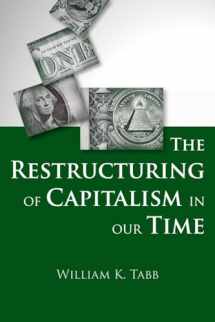
The Restructuring of Capitalism in Our Time
ISBN-13:
9780231158428
ISBN-10:
0231158424
Author:
William Tabb
Publication date:
2012
Publisher:
Columbia University Press
Format:
Hardcover
352 pages
FREE US shipping
on ALL non-marketplace orders
Marketplace
from $15.00
USD
Marketplace offers
Seller
Condition
Note
Seller
Condition
Used - Very Good
Edition: First Edition; Very Good/Very Good; First Printing with full number line. Binding is tight, sturdy, and square; boards and text also very good. Unclipped dust jacket arrives wrapped in protective mylar. Ships from Dinkytown in Minneapolis, Minnesota.
Book details
ISBN-13:
9780231158428
ISBN-10:
0231158424
Author:
William Tabb
Publication date:
2012
Publisher:
Columbia University Press
Format:
Hardcover
352 pages
Summary
The Restructuring of Capitalism in Our Time (ISBN-13: 9780231158428 and ISBN-10: 0231158424), written by authors
William Tabb, was published by Columbia University Press in 2012.
With an overall rating of 4.4 stars, it's a notable title among other
books. You can easily purchase or rent The Restructuring of Capitalism in Our Time (Hardcover) from BooksRun,
along with many other new and used
books
and textbooks.
And, if you're looking to sell your copy, our current buyback offer is $0.3.
Description
Actions taken by the United States and other countries during the Great Recession focused on restoring the viability of major financial institutions while guaranteeing debt and stimulating growth. Once the markets stabilized, the United States enacted regulatory reforms that ultimately left basic economic structures unchanged. At the same time, the political class pursued austerity measures to curb the growing national debt. Drawing on the economic theories of Keynes and Minsky and applying them to the modern evolution of American banking and finance, William K. Tabb offers a chilling prediction about future crises and the structural factors inhibiting true reform.Tabb follows the rise of banking practices and financial motives in America over the past thirty years and the simultaneous growth of a shadow industry of hedge funds, private equity firms, and financial innovations such as derivatives. He marks the shift from an American economy based primarily on the production of goods and nonfinancial services to one characterized by financialization, then shows how these developments, perspectives, and approaches not only contributed to the recent financial crisis but also prevented the enactment of effective regulatory reform. He incisively analyzes the damage that increasing unsustainable debt and excessive risk-taking has done to our financial system and expands his critique to a discussion of world systems and globalization. Revealing the willful blind spots of mainstream finance theory, Tabb moves beyond an economic model reliant on debt expansion and dangerous levels of leverage, proposing instead a social structure of accumulation that places economic justice over profit and, more practically, institutes an inclusive, sustainable model for growth.


We would LOVE it if you could help us and other readers by reviewing the book
Book review

Congratulations! We have received your book review.
{user}
{createdAt}
by {truncated_author}


